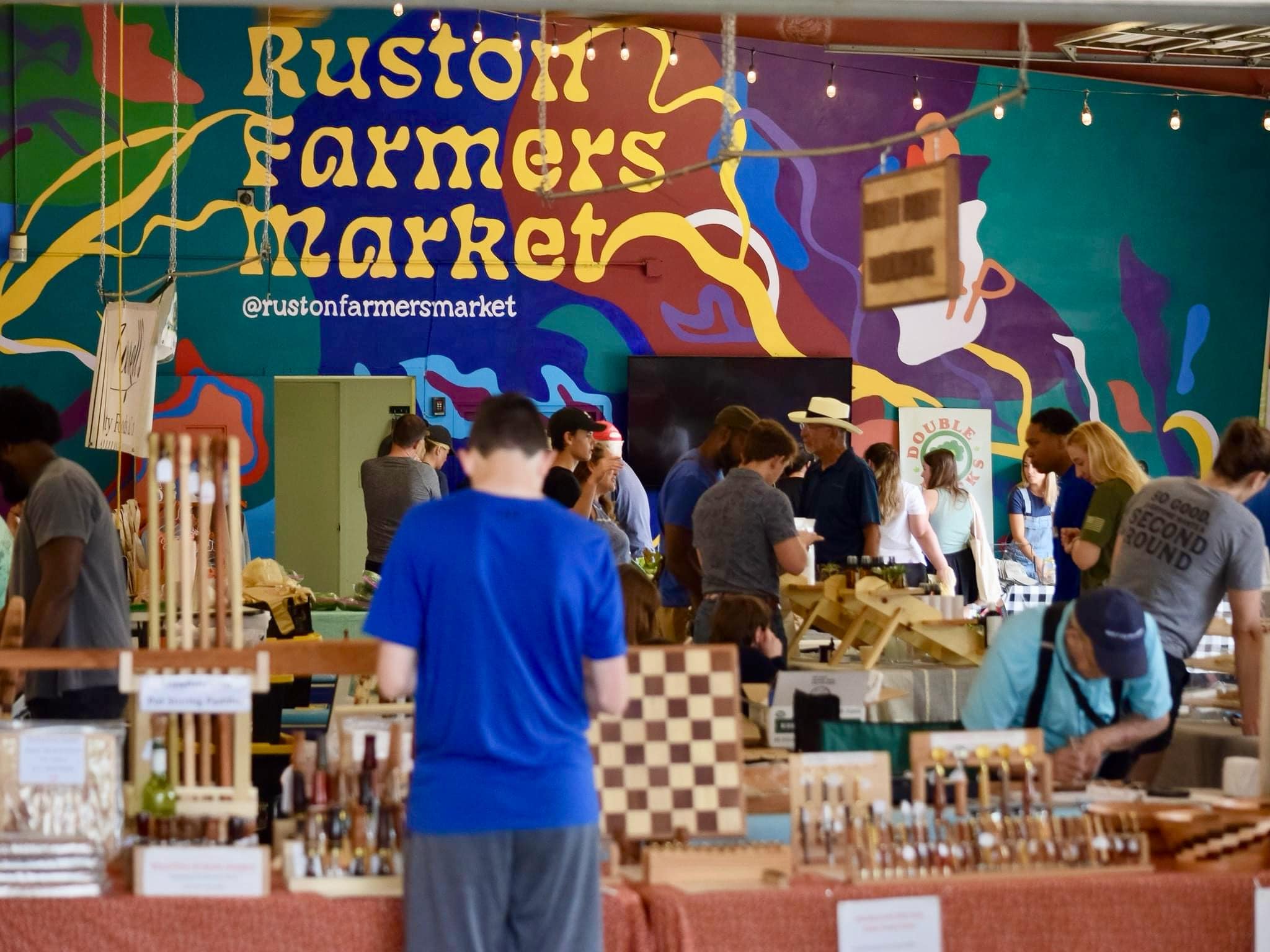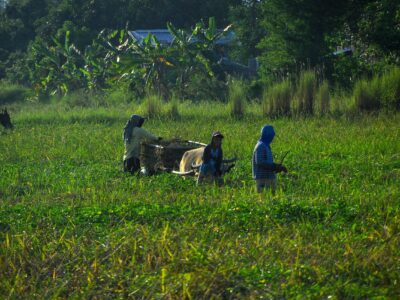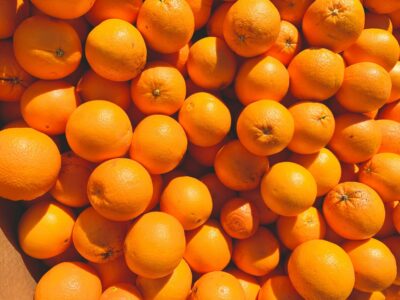Louisiana’s farmers markets seek to engage the community with local food innovatively, including educational lessons, hands-on experiences, children’s activities, fundraisers, raffles, and alternative transportation experiences.
Covington Farmers Market
The Covington Farmers Market is open two days per week. On Saturdays, it runs from 8 a.m. until noon, and on Wednesdays, it runs from 10 a.m. until 2 p.m. Saturdays feature free samples from local chefs and sweet tunes from local musicians.
Meanwhile, Wednesdays have a wider array of prepared lunch foods, including Nashville hot fried chicken sandwiches from Matt’s Sandwiches and vegan burgers and veggie sandwiches from Bhakti Farms, plus music courtesy of the Wednesday Covington Farmers Market Acoustic Jam. In fact, a grant was provided by the Louisiana Division of the Arts and the Louisiana State Arts Council to support the presence of this live music.
Photo Courtesy Matt’s Sandwiches
In fact, the market is a major supporter of local music. In conjunction with the City of Covington and the Heritage Bank of St. Tammany, it also sponsors the free Sunset at the Landing concert on the third Friday of each month between March and October.
Attendees are encouraged to bring lawn chairs and food or refreshments for picnics, which they can enjoy while listening to three musical acts.
Other non-musical groups are also welcomed and celebrated at the market. In October, the Wharton chapter of the Daughters of the American Revolution celebrated its 50th anniversary at the Wednesday operation. The group brought cake and talked with attendees about its work on historic preservation and education in the area.
Two years ago, a Saturday market in September featured a special event centered on the blessing of animals by Father Winston Rice, to which all people and pets were invited: “You’re welcome to bring your canine companions, feline friends, even your pet hamster and the like.”
Photo Courtesy Covington La Farmer’s Market
The main attractions are locally grown fruits and vegetables and locally produced or prepared milk, cheese, eggs, meat, poultry, seafood, bread and pastries, jams and jellies, juice, popsicles, and candies. However, those are just some of the commodities available for purchase.
At its heart, the goal of the market is to be a fun and convenient spot for vendors to sell their home-grown produce or home-made food products in an efficient and enjoyable manner. In fact, no non-food items are sold, and those present always include locally grown ingredients or a cultural or historical local connection.
Photo Courtesy Covington La Farmer’s Market
The market appears to truly care about its vendors. Charlene LeJeune from Abundant Life Kitchen frequently posts long, blog-like blurbs on the Facebook page raving about their produce and products.
“Stacy has wonderful flavors of her pickled vegetables (and fruits). These make wonderful hostess gifts and amazing side dishes and snacks!” she wrote ahead of Thanksgiving. “Abeer will be there with her Mediterranean goodies. Hummus and grape leaves make for a filling snack while you’re in the throes of cooking (oh! and the Baklava is great, too).”
Based on these extensive posts, each vendor offers something special and unique, adding value to any customer’s basket and resulting meal.
However, the market’s sense of community extends far beyond the local town. For example, in the wake of autumn’s hurricane season, the market posted asking its followers to “please be in prayer for our fellow countrymen on the East Coast. We know what it’s like to live through the destruction of our homes and businesses.”
Ruston Farmer’s Market
In 2007, a women’s book club found themselves troubled at the lack of local, fresh produce despite the town of Ruston being surrounded by agricultural land. They hung up flyers around town seeking interest from volunteers, which led to an opening meeting with more than 30 attendees.
In May 2008, the dream became a reality with the official launch, which continued to serve the community every Saturday from 9 a.m. until 1 p.m.
Every now and then, though, there is a special evening market that features the likes of an outdoor movie, live painting and music, and food trucks!
In 2010, North Louisiana Farm Fresh Inc. (NLFF) was created to support agriculture in the local area by not only running the operation and providing opportunities for direct producer-to-consumer sales but also educating community members about health, nutrition, sustainable agriculture, and where their food comes from. The farmers market operates as a program of this nonprofit.
In 2015, Mayor Ronny Walker allowed NLFF to move into an unused, city-owned warehouse, for which the nonprofit raised $30,000 for repairs via a fundraising farm-to-table dinner. These types of events have become commonplace for the organization, as seen in its annual dinner every autumn. Before it opened its new space, a mural class at Louisiana Tech University’s School of Design painted the outside of the building.
Photo Courtesy Ruston Farmers Market
The market has since gone on to win a variety of grants from organizations like the Plum Creek Foundation and the Farmers Market Promotion Program of the U.S. Department of Agriculture’s Agricultural Marketing Service that have contributed to hiring and furnishing. The Lincoln Health Foundation has also provided two grants to help match up to $10 in Supplemental Nutrition Assistance Program (SNAP) spending. Beyond SNAP benefits, the market also frequently runs canned food drives.
Another grant from the Ruston Lincoln Convention & Visitors Bureau enabled the market to open the Drew Jones Teaching Kitchen, named for a community member who left a “legacy of dedication to our community” when he passed away. The kitchen offers free classes that include educational seminars and hands-on cooking workshops.
This year, these have included a Kitchen Skills 101 class taught by chef Desi Bourgeois and a gingerbread baking and decorating class hosted by bakery Uptown Downtown.
A strength and balance class on the lawn before the operation opens on a Saturday morning is another example of the types of programming the market brings to the local community.
There is also a lot of opportunity for kids to benefit from the market. The kids’ corner, for example, even features a coloring table, a play kitchen, and eco-friendly toys donated by Garden Baby. There is even a kids’ cooking class; October’s edition hosted by LSU Ag saw attendees learn to make tortillas, guacamole, and salsa from scratch.
Additionally, the Youth Booth Program lets young entrepreneurs bring their products to five markets free of charge, providing them with the chance to connect with community members and learn about starting a business. According to the market, many entrepreneurs who have gotten their start at the marketplace have ended up building brick-and-mortar businesses.
Photo Courtesy Ruston Farmers Market
The market also holds several events that aim to give back. May’s Give For Good raises thousands of dollars for local nonprofits. In June, Life Share hosted a blood drive at the market, and for every four blood units collected, Mayor Ronny Walker was dunked in a dunking booth. For National Farmers Market Week in August, 4 PAWS Rescue, INC. brought adoptable puppies to partake in the celebrations.
As the market describes on its homepage, “Never underestimate what a group of people, what a community, can accomplish when working together, which is why people like you are so amazing. People like you make RFM strong!”
Photo Courtesy Ruston Farmers Market
Alexandria Farmers Market
The Alexandria Farmers Market aims to connect the city with the farmers, ranchers, and agricultural artisans in the local area. In fact, the average distance that food traveled from farms to the market last year was a mere 23.7 miles.
The benefits that have stemmed from this connection since it launched in 2014 include a more intertwined community, fresh and healthy food for community members, and a business opportunity for the producers and artisans. As the operation explains, because market-goers are often curious, entrepreneurs have a good chance for product experimentation with the benefit of immediate feedback.
However, long-established farmers and producers are not the only ones to benefit. This year, the market has been working on launching a produce consignment table called The Community Produce Table.
It assists new or part-time farmers and home gardeners in selling their produce at the market. These consignment vendors get to bring in revenue even though they would not qualify as traditional vendors.
Meanwhile, the community benefits from access to more kinds of food all year long, with about 50 markets spanning every season, always on Tuesdays from 3 p.m. until 6 p.m. Therefore, the program is more likely to accept growers of fruits and vegetables like greens, peppers, onions, carrots, and winter squash than growers of more readily available vegetables like cucumbers, tomatoes, okra, or summer squash.
Photo Courtesy The Community Produce Table
Additionally, vendors take turns hosting a happy hour at the market between 5 and 6 p.m. Vendors like 100% natural skincare company BRANCHOFF and sustainable family-owned farm Revolution Meat Co. are among the latest hosts. Each purchase also includes a raffle ticket for prizes that include a skincare gift set and five pounds of sausage.
In addition to accepting SNAP benefits, the market matches them dollar for dollar through the Alexandria Farmers Market SNAP Match Program, with funding provided by Market Umbrella’s Greaux the Good Program.
Additionally, a Kids Club ensures that young people under 18 get $5 each to shop for fresh fruits and vegetables. Last year, $41,552 was distributed through the SNAP and SNAP Match programs, while $20,714 was spent by children on fresh produce through the Kids Club.
Photo Courtesy The Community Produce Table
Not only does the Alexandria Farmers Market seek to benefit its currently existing community, but it also pays homage to those who came before it. Its website includes a land of acknowledgment statement recognizing the history of Louisiana’s Indigenous Tribes and the current state-recognized communities.
In addition to voicing its support for food access and sovereignty for these groups, it encourages others “to learn more about the Native Nations whose homelands this market resides on as well as the Indigenous homelands on which you live and work. We also invite you to deepen your relationship with the living lands and waters of this region.”
It seeks to produce positive externalities for the environment, as well. For every week during Alternative Transportation Month in November, the first 30 people to arrive by walking, biking, or riding the bus received a $10 Market Match Token to spend, as well as a raffle ticket for the chance to win a $250 gift card at the end of the month. Plus, a 2.65-mile community bike ride around the neighborhood wrapped up the month in a grand finale, with participants entering into another raffle and getting giveaways, including bike safety lights and reflective sashes.
Photo Courtesy Alexandria In Action





